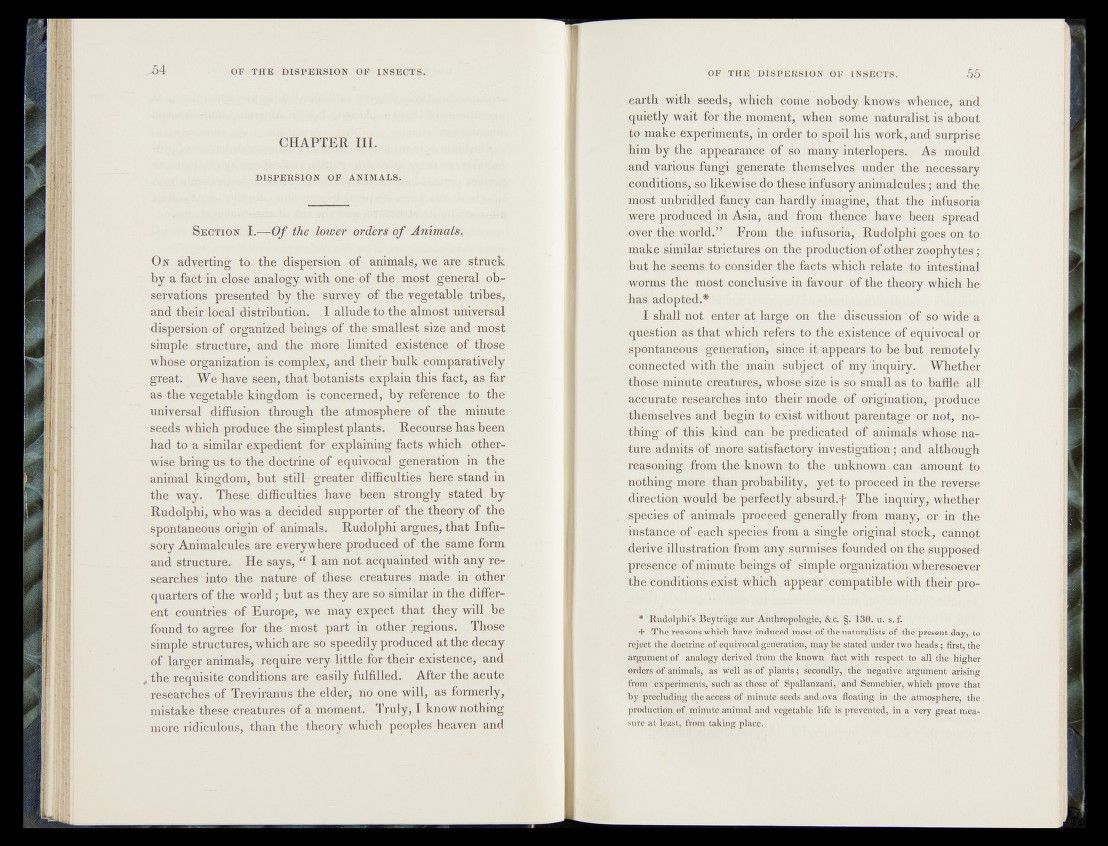
CHAPTER III.
DISPERSION OF ANIMALS.
S e c t io n I.— O f the lower orders o f Animals.
On adverting to the dispersion of animals, we are struck
by a fact in close analogy with one'of the most general observations
presented by the survey of the vegetable tribes,
and their local distribution. I allude to the almost universal
dispersion of organized beings of the smallest size and-most
simple structure, and the rhore limited existence of those
whose organization is complex, and their bulk comparatively
great. We have seen, th at botanists explain this fact, as far
as the vegetable kingdom is-concerned, by reference to the'
universal diffusion through the atmosphere of the minute
seeds which produce the simplest plants. Recourse has been
had to a similar expedient for explaining facts which otherwise
bring us to the doctrine of equivocal generation in the
animal kingdom, but still greater difficulties here stand in
the way. These difficulties have been strongly stated by
Rudolphi, who was a decided supporter of thejtheory of the
spontaneous origin of animals. Rudolphi argues, th a t Infu-
sory Animalcules are everywhere produced of thé same form
and structure. He says, “ l am not acquainted with any researches
into the nature of these creatures made in other
quarters of the world ; but as they are so similar in the different
countries of Europe, we may _expect that they will be
found to agree for the most part in other Regions. Those
simple structures, which are so speedily produced at the decay
of larger animals, require very little for their existence, and
4 the requisite conditions are easily fulfilled. After the acute
researches of Treviranus the elder, no one will, as formerly,
mistake these creatures of a moment. Truly, I know nothing
more ridiculous, than the theory which peoples heaven and
earth with seeds, which eome nobody knows whence, and
quietly Wait for tbejmoment, when some naturalist is about
to make Experiments, in qrder to spoil his work,and surprise
him by the appearance of -sb many interlopers. As mould
and various fungi .generate i themselves under the necessary
conditions,.so likewise do theseinC^sory animalcules ,* and the
most unbridledffahcy .can hardly imagine, that the infusoria
were produced in Asia, and-from thence have been spread
over the world.” From the infusoria, Rudolphi goes on to
make similar strictures on the production? of other zoophytes ;
h u t he -seems to consider the facts which -relate ^to -intestinal
worms the mbs#Mg®n<^ri»è ih favour ,M the theory; which; he
h a s adopted.*
11 shall not enter-, at largo qn the' discussion of so wide a
quesfci^h ass that which refers torthe.-existence» equivocal or
spontaneous, generation, since i t appears todae -b,uk remotely
^diïhected with thë, main subject >pf my inquiry. Whether
thpse|minute,.'creatures, whose.siae is so,-small as to baffle 'all
.accurate researches into ’ their mode.- o f origination^ produce
•theriiselyes and begin to ex i# without parentage or not,.'toothing*
of this -kind can be pWdicated'pf animals whose nature
admits -of more -satisfactory investigation ; and although
reasoning from the known to the unknown can .amount to
nothing more than probability,, ^yetftoÉproceed in the reverse
direction Would be perfectly abs.urd,.-f* The inquiry, whether
-species~of-animats proceed -generally from, many,,or in the
instance- of - each species- from a single original stock, - cannot
derive illustration from any surmises-founded on the. supposed
presence-of minute beings of simple organization wheresoever
the conditions exist which appear compatible, with .their pro-
* ^ftildolphi's Bèy trage zur Ahthr&pblogie,- 180. u$-ï stl“. -
+ The reasons which have induced most of the naturalists of thè present day,, to
reject the doctrine of equivocal generation, may be stated under two heads; first, the
argument of analogy derived from the known fact with respect to all the higher
orders ôf animals, as well as of plants ; secondly, thé negative argument arising
from1 experiments, such as those of Spallanzani, arid? Sennébier, which prove - that
by precluding the access of • tainutc seeds and. ova floating in. the atmosphere, the
production of jn.inute animal and vegetable life is prevented, in a very great measure
at least, from taking place.